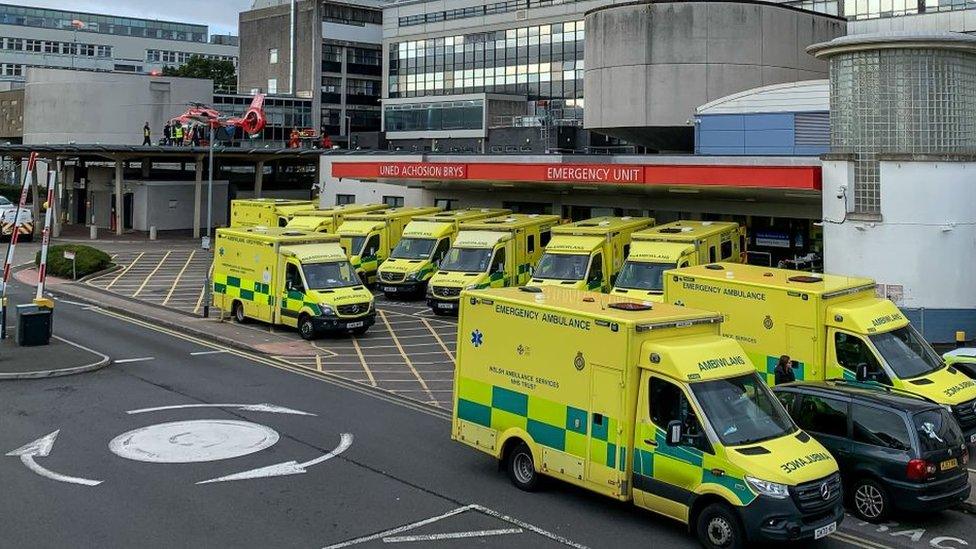NHS Strikes: Unite ambulance staff on the picket line
- Published
- comments
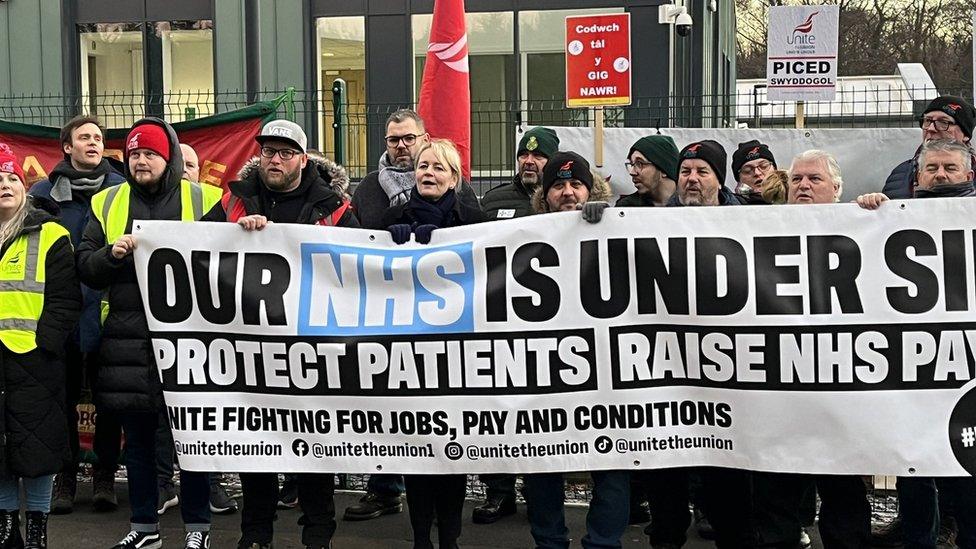
Unite general secretary Sharon Graham with workers on the Cardiff picket line on Monday morning
Members of the Unite union have begun striking in Wales, with talk of a deal described as "wholly premature".
But ambulance bosses have warned the service still faces "significant pressure" and have drafted in military personnel to drive ambulances.
Other health unions are set to ballot on a new pay offer from the Welsh government. Unite has strikes planned for 20, 21 and 22 February.
The Welsh government said it would continue talks with Unite.
Wales' Health Minister Eluned Morgan said: "Unite have absented themselves from that table by not suspending their action.
"And obviously we'll continue to talk to them, but it's a very, very different conversation, and I think it's really important that I make it clear that there is no more money."
She added that negotiations continue "in detail" with the other four unions which have postponed strike action, but there was "a timeframe" as the offer would use reserves from this financial year.
GMB union ambulance members put their walkout on hold last Friday.
The Royal College of Nursing (RCN), Royal College of Midwives (RCM) and Chartered Society of Physiotherapy (CSP) have also suspended strike action.
On Friday, the RCN called off its strikes planned for 6 and 7 February, and said it would put the new deal to a vote of members in Wales in the coming days.
RCM has called off strike action set for Tuesday and Friday this week.
The Welsh Ambulance Service Trust (WAST) said the continuing strike action by Unite would have an impact asking the public to "use our services wisely", external.
"Members of the public should continue to support us by calling us only in a life-threatening emergency," it warned.
Unite general secretary Sharon Graham held last-minute talks with Wales' Health Minister Eluned Morgan on Sunday.
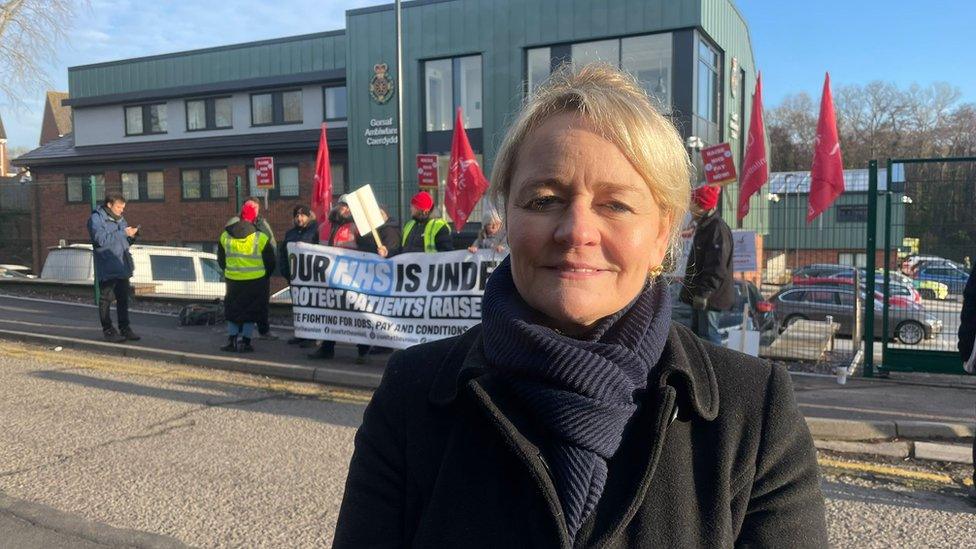
Sharon Graham at the Cardiff picket line on Monday
She also joined her members on the picket line at an ambulance station in Cardiff on Monday.
"We need to make sure that when the offer goes to the members, it's an offer they can accept. I know my members won't accept this offer," she told BBC Radio Wales Breakfast on Monday.
"Although they've given an extra 3%, over half of that is in a lump sum, and not on the actual long-term wages.
"All we're saying is, put some more of that that's in the lump sum onto the proper wages so that people have got it in their pay packets and they know that it's there forever.
"What we're trying to deal with here, yes is the pay, but also people leaving the service. People are not being retained because of the wages."
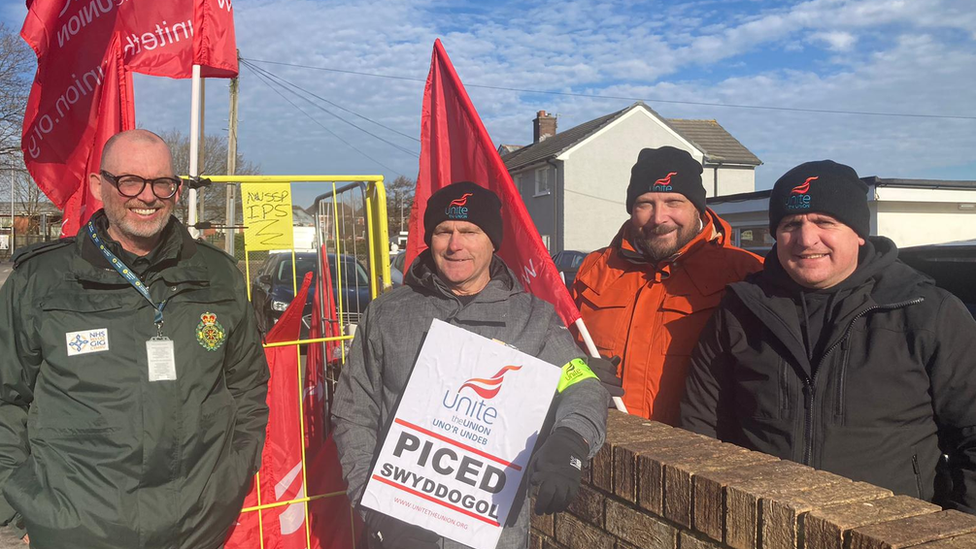
Striking ambulance staff in Llanelli
Ms Graham does not think the strength of Unite's position has been affected, despite other unions calling off their strikes.
"We're close, but we do need to move a little bit more on the wages, rather than just a one-off payment, which really in a sense is only for a moment in time and a sticking plaster," she said.
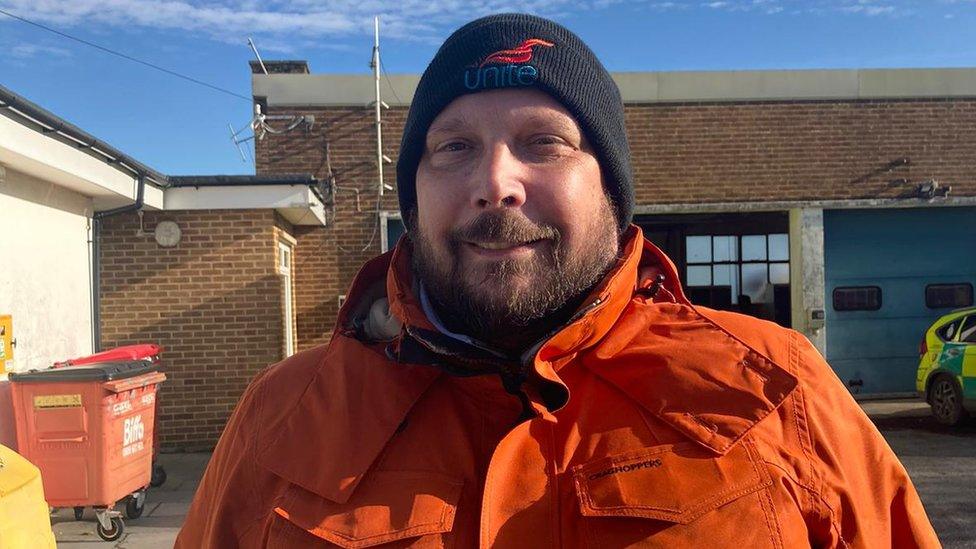
Paramedic Kevin Gamlin said there had been support, but also some abuse of striking workers
"Let's look at how we can save more money from the eye-watering agency bill with people on £60 an hour in some circumstances."
Some striking staff said they had experienced abuse on the picket line, paramedic Kevin Gamlin said.
"We were just on the picket line and people were showing their support. A gentleman in a van pulled straight across the road shouting abuse," Mr Gamlin said, adding the man said they should be negotiating rather than picketing.
"It just feels quite intimidating. We're not just here for pay we're here for patients to have a better experience. In all fairness we've had quite a bit of support as well," he added.
Twenty military personnel have been drafted in to support the service by driving ambulances.
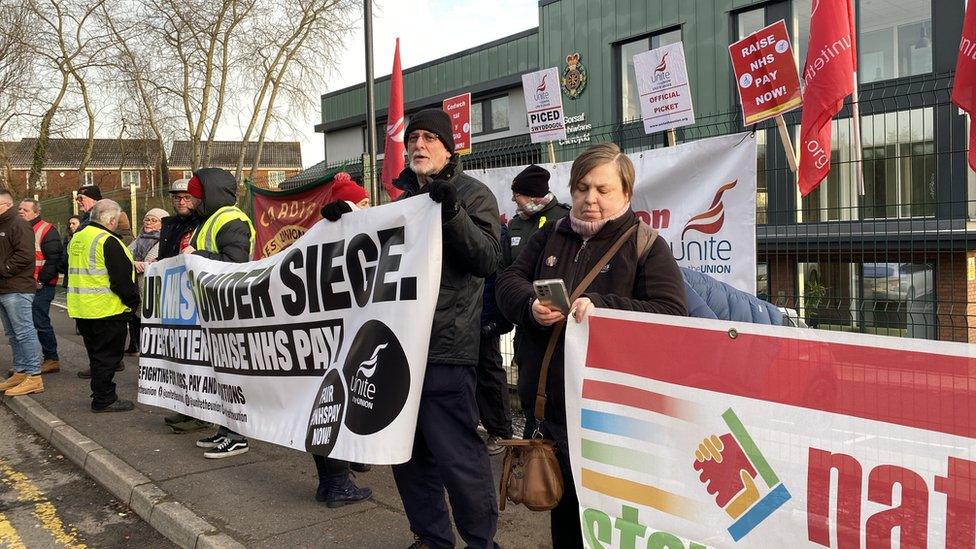
Unite members on the picket line in Cardiff on Monday morning
Zoe Codd, Unite's regional officer, said: "Whilst talks are still ongoing we hope that we can come to an offer that would be accepted by members."
The Welsh government has offered eight health unions an extra 3% in the first year on top of the £1,400 already promised.
The additional increase would be backdated to April 2022, with 1.5% of that carried forward and consolidated for future years.
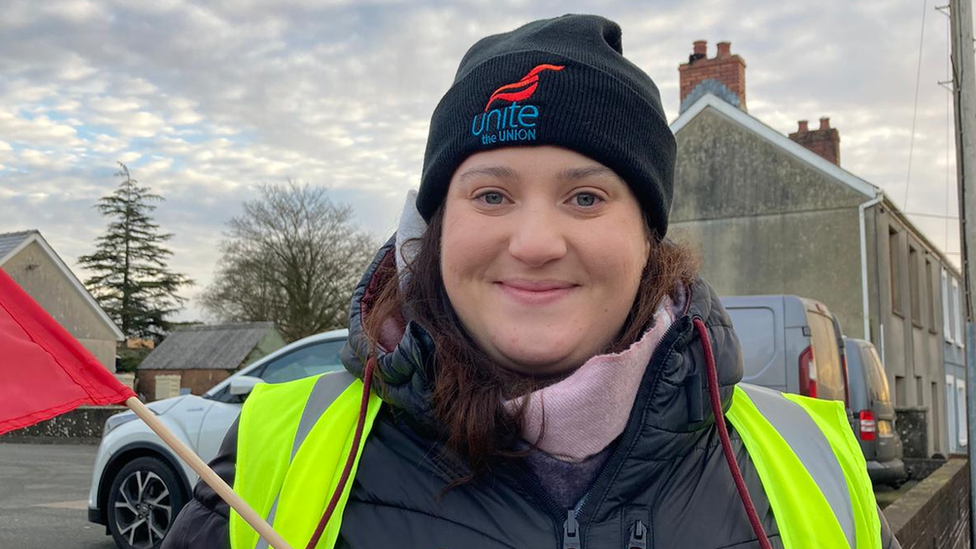
Zoe Codd hopes ministers can present an offer members are happy with
The Welsh government said on Sunday that talks were continuing: "We are pleased by the initial reception to the enhanced pay offer made to health trade unions.
"We continue to engage with them on a number of non-pay commitments to enhance staff well-being," it said. "We again thank those that have participated in the negotiations for their positive engagement and goodwill".
Finance Minister Rebecca Evans told BBC Politics Wales the extra cash to cover the pay offer to NHS staff meant the Welsh government would have "more difficult choices" to make in future years.
She said extra money for a pay settlement would come from £125m in its reserves in the first year.
Ms Evans said this was the maximum allowed to be withdrawn from reserves in a single year, but the Welsh NHS would then have to find £64m in savings annually to finance the deal.
Ms Graham said while senior representatives were not prepared to accept the new offer, "we are nearly there, I feel".
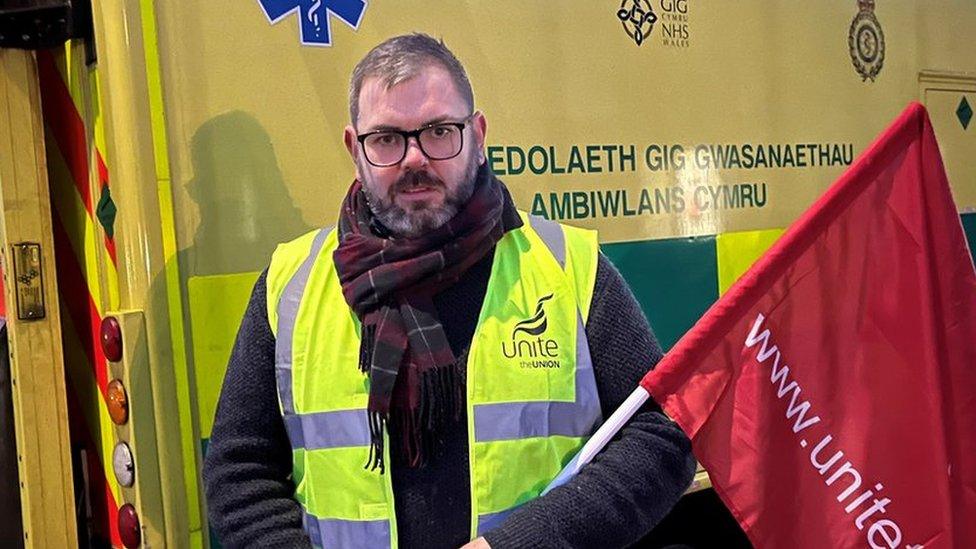
Ambulance staff have previously staged walkouts in Wales
Despite the suspension of NHS strike action by nurses, midwives and physiotherapists, health boards have warned patients not to expect an immediate return to normality.
People are being asked to attend appointments only if they have been contacted, as arrangements could not be made at short notice.
Elsewhere in the UK, England is still facing the biggest week of strikes in NHS history, with nurses and ambulance staff continuing walkouts in many areas.
Unions have accused the UK government of intransigence, with claims that ministers have refused to sit down for pay talks.
- Published19 January 2023
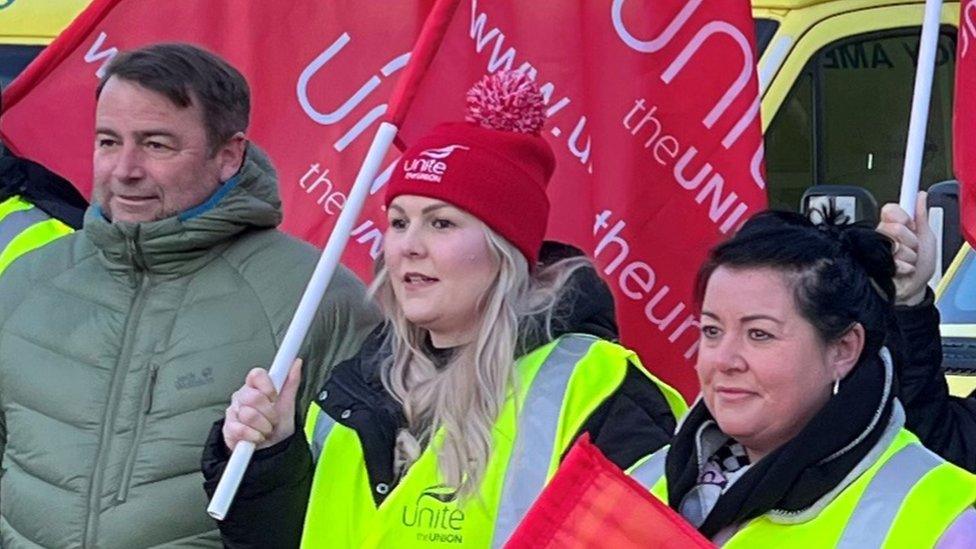
- Published16 January 2023

- Published12 January 2023
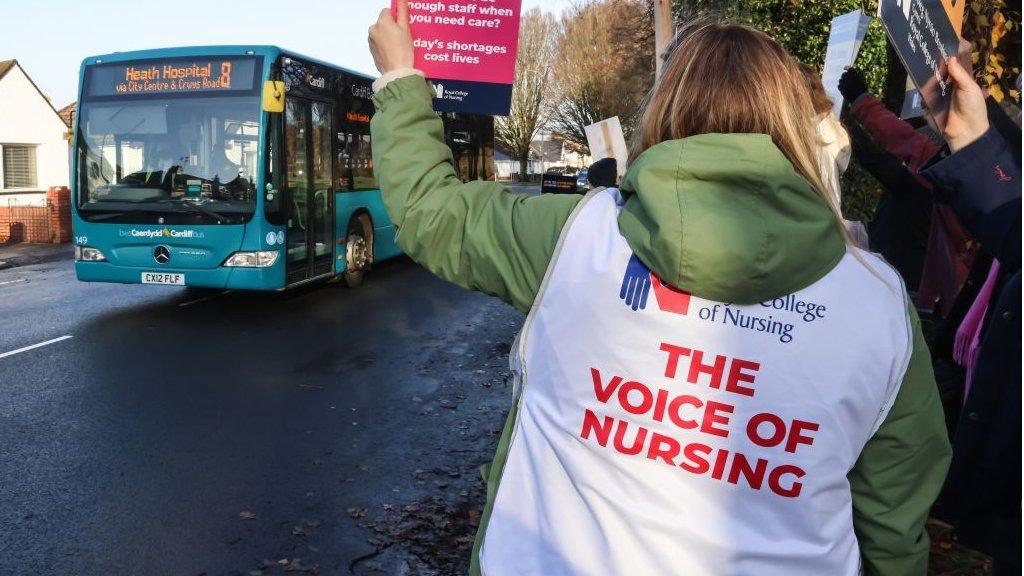
- Published11 January 2023
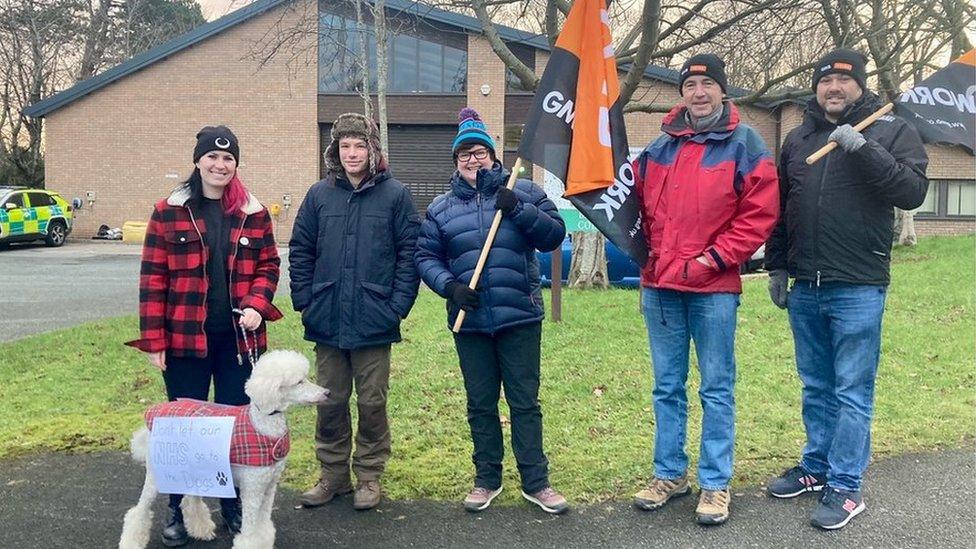
- Published6 January 2023
